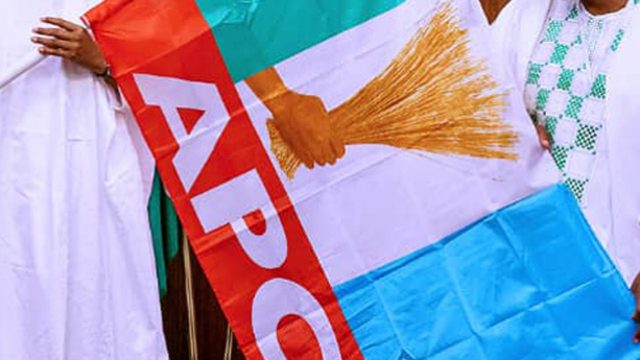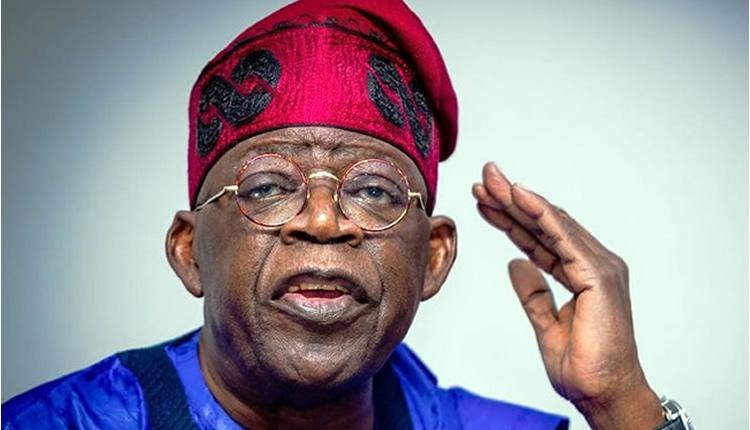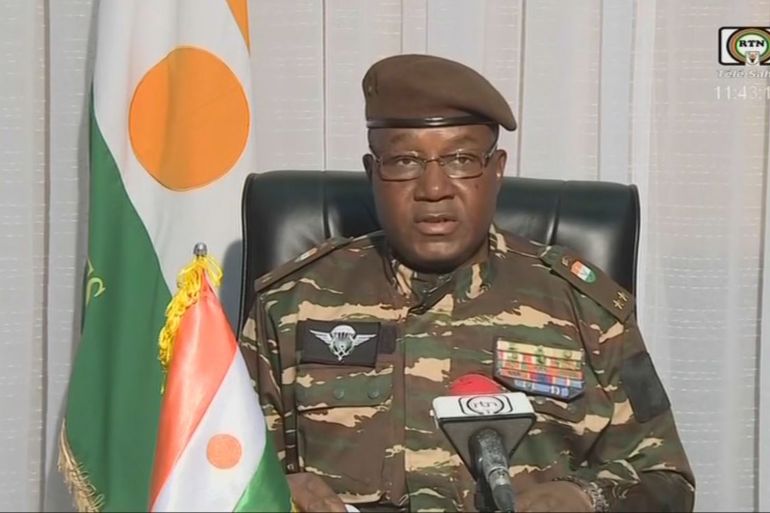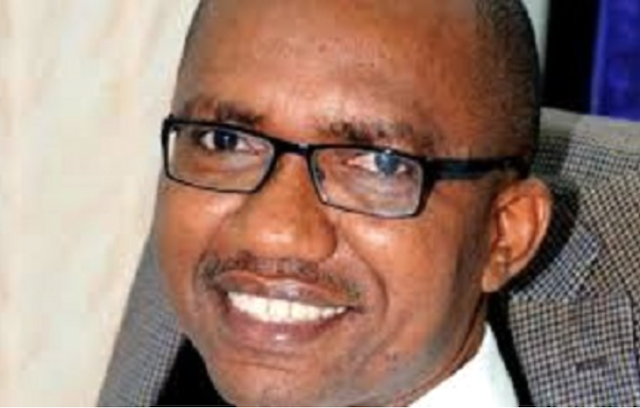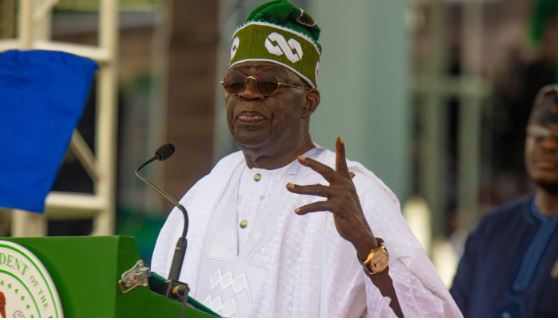Not only are military coups becoming frighteningly frequent in West and Central Africa, virtually all of them, it appears, also speak French. For the fifth time in three years in West Africa, soldiers struck again in Niger, Nigeria’s Northern neighbour, where former President Muhammadu Buhari had teasingly longed for refuge from Nigeria’s hostile press.
With the recent turn of events, however, it appears that Buhari’s speed train to Maradi, Niger’s ancient city, may have to find another destination.
It’s the fifth successful military coup in that country since 1960. Apart from the worn-out reasons of “deteriorating security and poor economic and social governance” given by the coup plotters, other familiar reasons have ranged from jihadist insurgencies to corruption and poverty; and from high birth rate to desertification.
As Nigeria’s president and new chairman of the regional Economic Community of West African States (ECOWAS), Bola Ahmed Tinubu, rallies the subregion to confront what is now called “Africa’s coup belt”, he would find that the problem in the region’s largest landlocked country, which shares the longest land border with Nigeria, is far more complicated than it appears.
It is heartening that the UN and the AU have condemned the coup and that the US and France have also lent their voices to the call for the soldiers in Niamey to return to the barracks.
Tinubu would find, however, that beneath the veneer of foreign concern lies a web of vested interests and powerplay involving the US, but particularly France and China, that make other well-known complications in Niger look like small potatoes.
Once upon a time – and that was about one and a half decades ago – it was widely assumed that after multi-party democracy was introduced in that country in 2010 following the coup that removed President Mamadou Tanja, Niger would finally have a chance to reset.
In fact, the man who took office after the brief spell of military takeover, Mahamadou Issoufou, acquitted himself so well after two terms in office that he received the Mo Ibrahim Prize for good governance. President Mohamed Bazoum, widely expected to build on Issoufou’s fragile record, had only been in office two years before soldiers removed him on July 26.
However tempting it is to resist the trope of looking for foreign scapegoats, it’s fair to say that the snake of Niger’s problem has its hand buried in the womb of the unfinished problems of Tanja’s confrontation with France.
That confrontation, which finally left Tanja in bed with the Chinese over Niger’s uranium and mineral deposits and, in fact, also produced a refinery built by the Chinese, became compounded by other factors, a number of which were, sadly, self-inflicted, over the years.
Tanja, a former colonel, was on the verge of serving out his constitutional two-term limit of five years each, when he instigated an extension. When the process appeared doomed to fail, he not only scrapped the constitutional court that ruled that his attempt was illegal, but also scrapped the parliament. But that’s only part of the story.
The other important part was Tanja’s confrontation with French state-owned atomic energy group, Areva, which had enjoyed a de facto monopoly of the country’s rich uranium, a strategic resource for France’s nuclear power. Areva’s profit from uranium is twice Niger’s GDP.
In a multi-million-dollar deal with China in which Tanja did not mind cutting Niger’s nose to spite the face of France, he pulled the plug on Francophone Africa’s most significant player, making the French play second fiddle to the new Chinese bride. When the tables turned following Tanja’s ouster, Paris was more than happy to dance on his political grave. But the story did not end there.
According to Tom Burgis in his no-holds-barred book, The Looting Machine, Niger spent $47 million from the proceeds of the uranium deal on arms to suppress the Tuareg rebels; and when a further $300 million came later from signature payment by China National Petroleum Corporation, to develop an oil block, the question was no longer whether Tanja could afford to make trouble, but how much.
“The military coup against Tanja,” Burgis wrote, “deepens fears in Africa that China’s competition with the old powers for the continent’s resources was giving rise to a new and ruinous rivalry like that of the Cold War which had allowed dictators to play Communist and capitalist suitors against one another.”
It was in these circumstances that after the unravelling of Libya, jihadist insurgents found willing recruits among Tuaregs. With the avalanche of light arms flowing out of the broken North African country, it was not too difficult for power hungry soldiers in Niger to topple Tanja’s corrupt government in 2010, ushering in a brief spell of military rule.
Deposed President Bazoum, who was elected only two years ago, steered Niger back to warm relations with Paris which, obviously, is one of the main grouses of the soldiers.
In a viral statement credited to coup leader, Major General Abdurrahman Tchiani, he accused the president of taking orders from France before deciding what to do with terrorists, without regard for the lives of Nigerien soldiers “falling at the fronts.” And added, for good measure, that regional leaders with dubious electoral records had no moral right to challenge the coup.
The coup is a huge embarrassment for ECOWAS, yet from its record, the likely failure of the one-week ultimatum to the soldiers in Niamey would only compound the misery of the regional body. Already, the military governments of Burkina Faso, Mali and Guinea, have lined up behind Niger, threatening to quit any regional group that enforces sanctions against Niger.
Apart from Sao Tome and Principe, Sierra Leone and perhaps also in The Gambia, not once in the last nearly 30 years or so has ECOWAS been able to reverse a military takeover in any country.
And sadly, for the region, the Niger coup is coming at a time when its chairman and president of the regional powerhouse, Tinubu, is facing a perfect storm at home: protests by Labour and widespread economic discontent as the president struggles to fix the country.
It does not help also that while ECOWAS is tightening its noose around Niger, the Wagner mercenaries, that French nightmare with Russian roots, is expanding its footprint on the continent, lurking in the shadows and hoping to do for the Nigerien coup plotters what it did for their Malian cousins.
Of course, ECOWAS must do what is necessary to prevent the contagion of military coups, reminiscent of the 1980s and 1990s. But the coup in Niger also highlights the increasing failure of periodic elections and Western-style democracy to deliver value for the swathes of citizens chafing under flawed elections and corrupt governments.
The swift response of the regional body is commendable as it is a clear message that it would not be business as usual for soldiers. Yet, with foreign interests prowling the region and waiting to pounce, it is improbable that the soldiers in Niamey would trade off what appears to be fairly widespread support and return to the barracks with their tail between their legs.
French legacy of namby-pamby in Francophone West Africa well past its usefulness, except for France, appears to have come back to haunt Mère France with a fury. ECOWAS may have to review its ultimatum and adopt a negotiated exit, with former President Olusegun Obasanjo’s example in Sao Tome in 2003, as guide.
Since ECOWAS was founded in 1975, only one country, Mauritania, has left. Tinubu cannot afford to be the president that lost three ECOWAS countries in two months. If the regional body manages to chase away the Nigerien soldier kites, it might also have to return to warn the numerous straying democracy chicks across the region, to mend their catastrophically prodigal ways.
